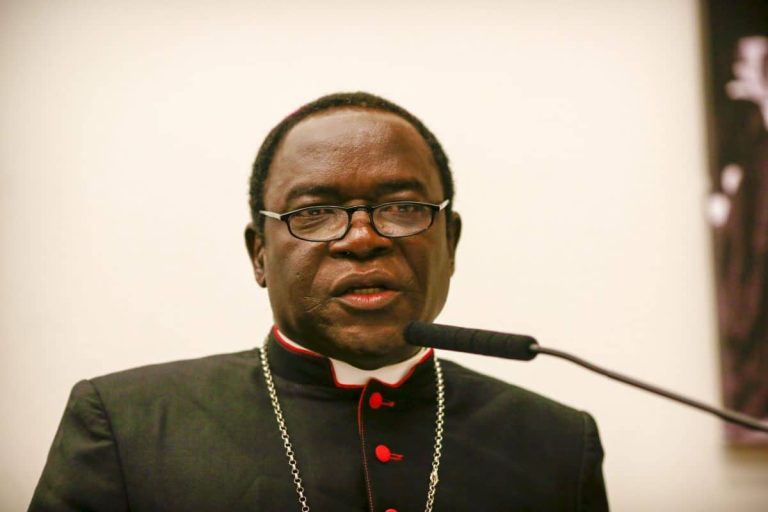From Okwe Obi, Abuja
The Catholic Bishop of Sokoto Diocese, Matthew Kukah, has suggested that, except for the current President Bola Tinubu, former Presidents Olusegun Obasanjo, Umaru Yar’Adua, Goodluck Jonathan, and Muhammadu Buhari assumed office without adequate preparation.
He, however, said it was unfortunate that millions of Nigerians still battle poverty despite President Tinubu’s preparedness to govern the country, adding that unless the President was pretending when he said he was ready for governance.
Kukah stated this at the 4th Amaka Ndoma-Egba Memorial Lecture, with the theme “Leaders of Tomorrow: Creating Lasting Change in a Complex World,” at the weekend in Abuja.
The deceased, who was the wife of former Senate Leader Senator Ndoma Egba, died in an auto crash in Ondo State in 2020.
The cleric attributed the country’s leadership challenges to the lack of knowledge, capacity, and preparedness of its leaders.
Tracing the history of Nigeria’s leadership, he observed that none of the country’s past leaders, including former Presidents Muhammadu Buhari, Goodluck Jonathan, Umaru Yar’Adua, Olusegun Obasanjo, Ernest Shonekan, Sani Abacha, among others, came to power prepared.
He said: “I do not want to bore you, but if you run through the history, you will find that almost everybody who came to power in Nigeria did so as a result of one accident or another.
“President Tinubu, well, he prepared for it. However, we are still trying to get off the ground. But he took over from Buhari, who had already given up.
“Buhari took over from Jonathan, who was thinking that after finishing as deputy governor, he would go somewhere else, and then something happened.
“Jonathan took over from Yar’Adua, who had actually said he was going to teach at Ahmadu Bello University when he finished his term as governor.
“Yar’Adua took over from Obasanjo, who was in prison and was not expecting to come out, but somehow found himself out of prison.
“Obasanjo took over from Abacha, who, sadly, even though the five political parties had said he would rule forever, nature took him.
“Abacha took over from Ernest Shonekan, who was busy at the United African Company of Nigeria, and then they told him to come and be head of state. We can go all the way down, but fundamental to governance is knowledge.”
The bishop also argued that the benefits of democracy were beyond physical infrastructure, roads, railways, and other projects.
According to him, if democracy were solely about infrastructure, people would still be praising authoritarian regimes like Adolf Hitler and apartheid South Africa, which he said built impressive infrastructure during their reigns.
“Democracy’s benefits are often not necessarily measurable. They are largely intangible. It is understanding how to expand the frontiers of human imagination,” he stated.
He also decried the culture of nepotism in the country, saying that ministerial appointments, among others, were often based on personal relationships rather than merit.
He observed that Nigerians are impatient with the current state of democracy in the country, which he noted is hardly working.
Kukah stated that despite the country’s little progress, Nigerians are never satisfied, adding that the nation will never be in a perfect place because such places do not exist.
He said: “We have made a choice to live with democracy as it is. We know that our democracy is hardly working, hardly functioning, although I would be quick to say that we are very impatient with ourselves, very, very impatient.
“Nigerians are surprised when I say we have done pretty well. We are absolutely not happy and we will probably never be happy because that’s not how the world is. You’ve got this, you want this, you want that. We are insatiable.
“Now, we are not in a perfect place, because perfect places don’t exist, and we shouldn’t be looking for leaders who will take us to a place of perfection, because nobody has found that kind of place. However, there are minimum conditions that we require in a leader, and I think we need to use them to measure the whole concept of leadership.”
The bishop stressed the need for leaders to have set goals, boldness, courage, and patriotism, adding that true leadership was about influencing citizens, not just holding office.
Meanwhile, Cross River State Governor Bassey Otu commissioned a legacy building in honour of the deceased.
On his part, Chairman of the National Drug Law Enforcement Agency (NDLEA), Buba Marwa, charged students to shun drug abuse.
He described drug abuse as the number one challenge facing the country today and called on stakeholders to invest in the advancement of youth to ensure that their potential is properly harnessed.
He described the late Amaka Ndoma-Egba as a visionary agent who established Start-Rite Schools to ensure that students learn and imbibe the necessary life skills required to navigate an ever-challenging world.
